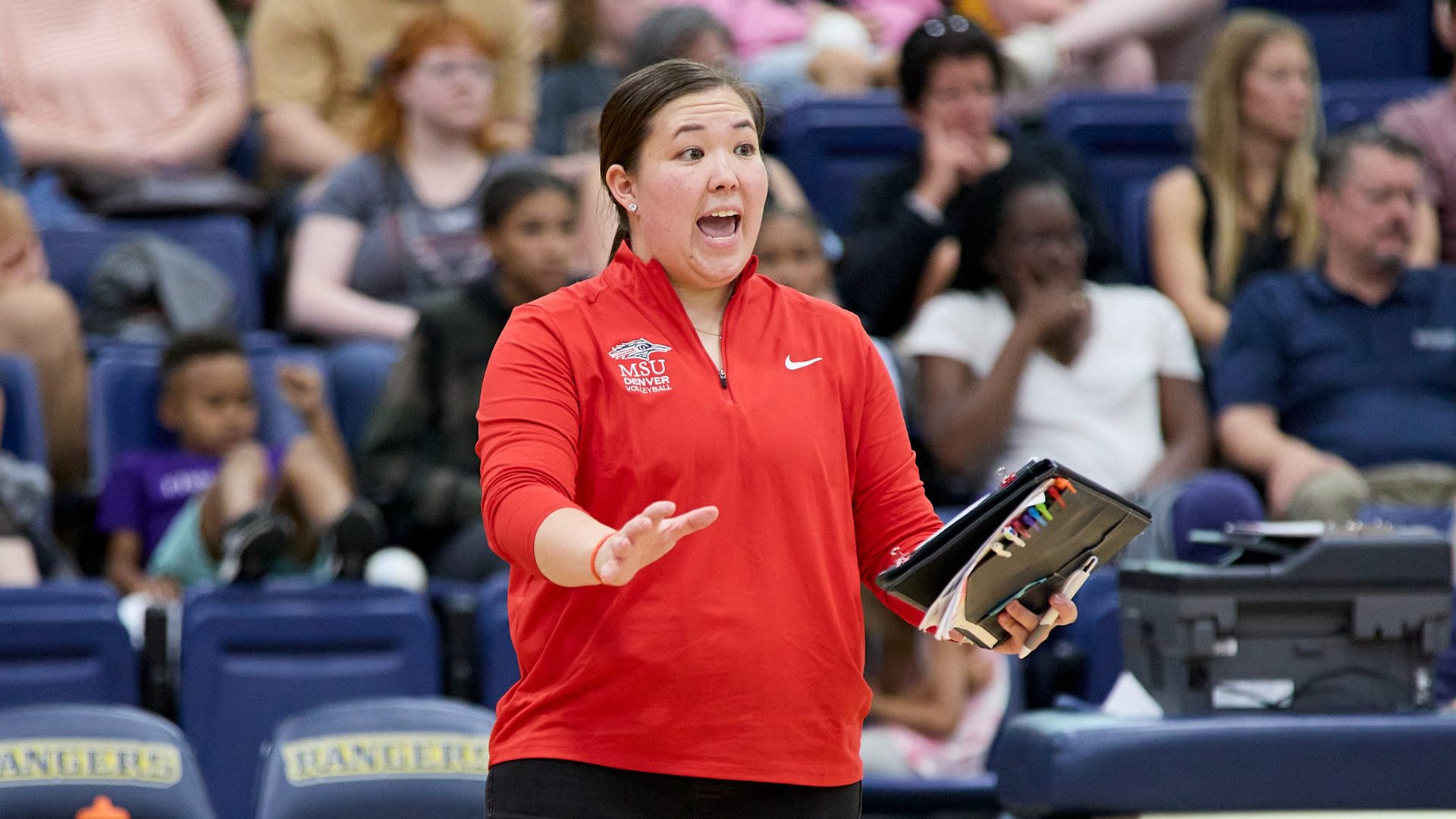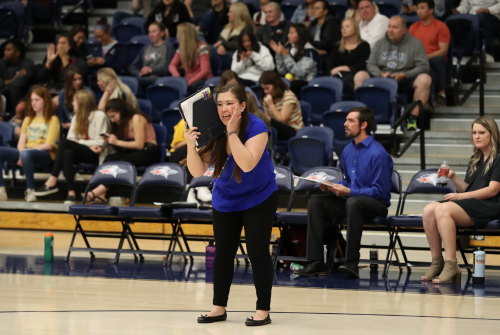
MSU Denver Associate women's volleyball coach Amy Watanabe.

Amy Watanabe is one of the winningest coaches and players in Metropolitan State University of Denver’s history. But her volleyball career almost ended after high school.
As an athlete with a small stature, Watanabe wasn’t recruited by MSU Denver. Instead, she tried out and was allowed to play as a walk-on practice player. At the time, Watanabe was just happy to be on the team. She had no idea of the long-term impact she would have on the volleyball program and the legacy she would create at MSU Denver.
Aces and adversity
Watanabe loved volleyball, playing for her high school in Littleton and the local club team. Academics were more challenging — Watanabe has dyslexia, and traditional schooling left her feeling discouraged. “The education system is not built for my brain, and that’s just the reality,” she said. “My academic journey has been heavy, and it’s affected my self-confidence. Volleyball has always been my bright side. Any lack of confidence or feeling stupid in the classroom was balanced when I excelled on the court.”
After earning her spot on the MSU Denver volleyball team, Watanabe became laser-focused on staying eligible. “It took me a semester or two, but eventually I learned how to advocate for myself,” she said. “The Access Center provided me with some excellent resources and accommodations. I still struggled, but I didn’t want anything to jeopardize my ability to play volleyball.”
Watanabe went on to become one of the most successful players in the volleyball program, graduating in 2009 as the school’s all-time leader in digs, a record she still holds. She also earned her undergraduate degree in Human Performance and Sport with a Physical Education concentration from MSU Denver and a master’s degree in eLearning Design and Implementation through the University of Colorado Denver.
Now the Roadrunners associate head volleyball coach, Watanabe is leading the team as it makes its 23rd consecutive appearance in the NCAA Tournament. No longer content with just making it to the tournament, Watanabe is leveraging the way her brain works to propel the team forward.

“The way I coach is different because the way I think is different — my learning disability is a strength,” she said. “I am very creative, so when we’re coaching, if somebody’s not understanding one of the concepts, I will devise a new solution to train it.” Watanabe has taught blocking by painting her players’ hands and made sure their passing postures were correct by attaching pool noodles to backpacks.
Her strategy is working. The team has made it to the NCAA regional finals for the past three seasons. Continuing to think outside the box, Watanabe has also implemented a visualization–and–meditation program for her athletes. “I’ll take them through various exercises to practice seeing their plays go well,” she explained. “Over the last two years, we’ve visualized winning a national championship.”
Digging in and leaving a legacy
Whatever the tournament results, Watanabe will continue to make a lasting impact on her sport. “We love to win, and as a staff we also want to ensure that these athletes are successful after they finish playing,” Watanabe said. Every spring, the coaches spend time building the team’s character. “We care about who they’re becoming,” Watanabe said. “When they eventually lose the structure of volleyball, we want them to have the foundation to be successful, to use what they’ve learned from being a student-athlete.”
She also has her eye on making college sports more equitable. Many college-level athletic programs recruit from club teams, which are historically expensive and lack diversity. To overcome this obstacle, Watanabe created an “opportunity camp” for high school athletes who don’t play club volleyball. Last year, more than 150 students from metro Denver participated. “I would love to grow the clinic into a recruiting combine where junior-college and NAIA (National Association of Intercollegiate Athletics) coaches attend and get these kids access to being seen,” said Watanabe. “I’m super-passionate about the idea. I have no funding, but I do have the platform.”
Thanks to her unorthodox ideas and different viewpoint, Watanabe is excited to rethink old paradigms beyond volleyball. “It’s hard, but as a university we need to continue to reimagine how we do things,” she said. “If we’re going to serve untraditional students, then we probably can’t operate in traditional ways. We can’t be scared of thinking differently and trying something new.”

